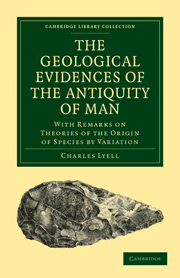 The Geological Evidences of the Antiquity of Man
The Geological Evidences of the Antiquity of Man Book contents
- Frontmatter
- Contents
- CHAPTER I INTRODUCTION
- CHAPTER II RECENT PERIOD—DANISH PEAT AND SHELL MOUNDS—SWISS LAKE DWELLINGS
- CHAPTER III FOSSIL HUMAN REMAINS AND WORKS OF ART OF THE RECENT PERIOD
- CHAPTER IV POST-PLIOCENE PERIOD: BONES OF MAN AND EXTINCT MAMMALIA IN BELGIAN CAVERNS
- CHAPTER V POST-PLIOCENE PERIOD: FOSSIL HUMAN SKULLS OF THE NEANDERTHAL AND ENGIS CAVES
- CHAPTER VI POST-PLIOCENE ALLUVIUM AND CAVE DEPOSITS WITH FLINT IMPLEMENTS
- CHAPTER VII PEAT AND POST-PLIOCENE ALLUVIUM OF THE VALLEY OF THE SOMME
- CHAPTER VIII POST-PLIOCENE ALLUVIUM WITH FLINT IMPLEMENTS OF THE VALLEY OF THE SOMME—concluded
- CHAPTER IX WORKS OF ART IN POST-PLIOCENE ALLUVIUM OF FRANCE AND ENGLAND
- CHAPTER X CAVERN DEPOSITS, AND PLACE OF SEPULTURE OF THE POST-PLIOCENE PERIOD
- CHAPTER XI AGE OF HUMAN FOSSILS OF LE PUY IN CENTRAL FRANCE AND OF NATCHEZ ON THE MISSISSIPPI, DISCUSSED
- CHAPTER XII ANTIQUITY OF MAN RELATIVELY TO THE GLACIAL PERIOD AND TO THE EXISTING FAUNA AND FLORA
- CHAPTER XIII CHRONOLOGICAL RELATIONS OF THE GLACIAL PERIOD AND THE EARLIEST SIGNS OF MAN'S APPEARANCE IN EUROPE
- CHAPTER XIV CHRONOLOGICAL RELATIONS OF THE GLACIAL PERIOD AND THE EARLIEST SIGNS OF MAN'S APPEARANCE IN EUROPE—continued
- CHAPTER XV EXTINCT GLACIERS OF THE ALPS AND THEIR CHRONOLOGICAL RELATION TO THE HUMAN PERIOD
- CHAPTER XVI HUMAN REMAINS IN THE LOESS, AND THEIR PROBABLE AGE
- CHAPTER XVII POST-GLACIAL DISLOCATIONS AND FOLDINGS OF CRETACEOUS AND DRIFT STRATA IN THE ISLAND OF MÖEN, IN DENMARK
- CHAPTER XVIII THE GLACIAL PERIOD IN NORTH AMERICA
- CHAPTER XIX RECAPITULATION OF GEOLOGICAL PROOFS OF MAN'S ANTIQUITY
- CHAPTER XX THEORIES OF PROGRESSION AND TRANSMUTATION
- CHAPTER XXI ON THE ORIGIN OF SPECIES BY VARIATION AND NATURAL SELECTION
- CHAPTER XXII OBJECTIONS TO THE HYPOTHESIS OF TRANSMUTATION CONSIDERED
- CHAPTER XXIII ORIGIN AND DEVELOPMENT OF LANGUAGES AND SPECIES COMPARED
- CHAPTER XXIV BEARING OF THE DOCTRINE OF TRANSMUTATION ON THE ORIGIN OF MAN, AND HIS PLACE IN THE CREATION
- INDEX
CHAPTER XXIV - BEARING OF THE DOCTRINE OF TRANSMUTATION ON THE ORIGIN OF MAN, AND HIS PLACE IN THE CREATION
Published online by Cambridge University Press: 29 August 2010
- Frontmatter
- Contents
- CHAPTER I INTRODUCTION
- CHAPTER II RECENT PERIOD—DANISH PEAT AND SHELL MOUNDS—SWISS LAKE DWELLINGS
- CHAPTER III FOSSIL HUMAN REMAINS AND WORKS OF ART OF THE RECENT PERIOD
- CHAPTER IV POST-PLIOCENE PERIOD: BONES OF MAN AND EXTINCT MAMMALIA IN BELGIAN CAVERNS
- CHAPTER V POST-PLIOCENE PERIOD: FOSSIL HUMAN SKULLS OF THE NEANDERTHAL AND ENGIS CAVES
- CHAPTER VI POST-PLIOCENE ALLUVIUM AND CAVE DEPOSITS WITH FLINT IMPLEMENTS
- CHAPTER VII PEAT AND POST-PLIOCENE ALLUVIUM OF THE VALLEY OF THE SOMME
- CHAPTER VIII POST-PLIOCENE ALLUVIUM WITH FLINT IMPLEMENTS OF THE VALLEY OF THE SOMME—concluded
- CHAPTER IX WORKS OF ART IN POST-PLIOCENE ALLUVIUM OF FRANCE AND ENGLAND
- CHAPTER X CAVERN DEPOSITS, AND PLACE OF SEPULTURE OF THE POST-PLIOCENE PERIOD
- CHAPTER XI AGE OF HUMAN FOSSILS OF LE PUY IN CENTRAL FRANCE AND OF NATCHEZ ON THE MISSISSIPPI, DISCUSSED
- CHAPTER XII ANTIQUITY OF MAN RELATIVELY TO THE GLACIAL PERIOD AND TO THE EXISTING FAUNA AND FLORA
- CHAPTER XIII CHRONOLOGICAL RELATIONS OF THE GLACIAL PERIOD AND THE EARLIEST SIGNS OF MAN'S APPEARANCE IN EUROPE
- CHAPTER XIV CHRONOLOGICAL RELATIONS OF THE GLACIAL PERIOD AND THE EARLIEST SIGNS OF MAN'S APPEARANCE IN EUROPE—continued
- CHAPTER XV EXTINCT GLACIERS OF THE ALPS AND THEIR CHRONOLOGICAL RELATION TO THE HUMAN PERIOD
- CHAPTER XVI HUMAN REMAINS IN THE LOESS, AND THEIR PROBABLE AGE
- CHAPTER XVII POST-GLACIAL DISLOCATIONS AND FOLDINGS OF CRETACEOUS AND DRIFT STRATA IN THE ISLAND OF MÖEN, IN DENMARK
- CHAPTER XVIII THE GLACIAL PERIOD IN NORTH AMERICA
- CHAPTER XIX RECAPITULATION OF GEOLOGICAL PROOFS OF MAN'S ANTIQUITY
- CHAPTER XX THEORIES OF PROGRESSION AND TRANSMUTATION
- CHAPTER XXI ON THE ORIGIN OF SPECIES BY VARIATION AND NATURAL SELECTION
- CHAPTER XXII OBJECTIONS TO THE HYPOTHESIS OF TRANSMUTATION CONSIDERED
- CHAPTER XXIII ORIGIN AND DEVELOPMENT OF LANGUAGES AND SPECIES COMPARED
- CHAPTER XXIV BEARING OF THE DOCTRINE OF TRANSMUTATION ON THE ORIGIN OF MAN, AND HIS PLACE IN THE CREATION
- INDEX
Summary
SOME of the opponents of transmutation, who are well versed in Natural History, admit that though that doctrine is untenable, it is not without its practical advantages as a ‘useful working hypothesis,’ often suggesting good experiments and observations, and aiding us to retain in the memory a multitude of facts respecting the geographical distribution of genera, and species, both of animals and plants, and the succession in time of organic remains, and many other phenomena which, but for such a theory, would be wholly without a common bond of relationship.
It is in fact conceded by many eminent zoologists and botanists, as before explained, that whatever may be the nature of the species-making power or law, its effects are of such a character as to imitate the results which variation, guided by natural selection, would produce, if only we could assume with certainty that there are no limits to the variability of species. But as the anti-transmutationists are persuaded that such limits do exist, they regard the hypothesis as simply a provisional one, and expect that it will one day be surperseded by another cognate theory, which will not require us to assume the former continuousness of the links which have connected the past and present states of the organic world, or the outgoing with the incoming species.
- Type
- Chapter
- Information
- The Geological Evidences of the Antiquity of ManWith Remarks on Theories of the Origin of Species by Variation, pp. 471 - 506Publisher: Cambridge University PressPrint publication year: 2009
